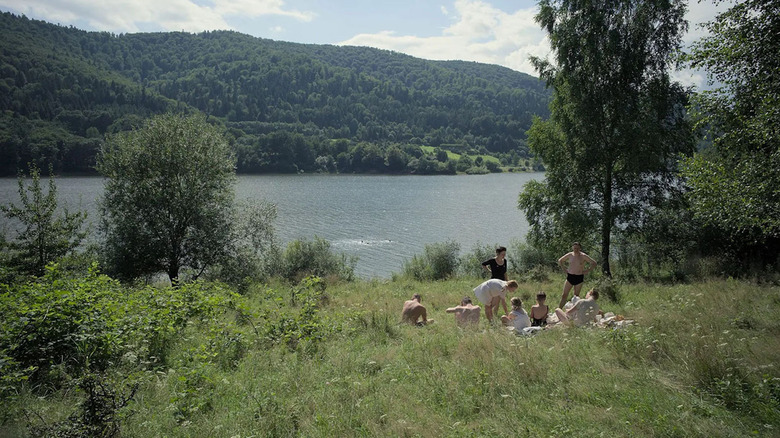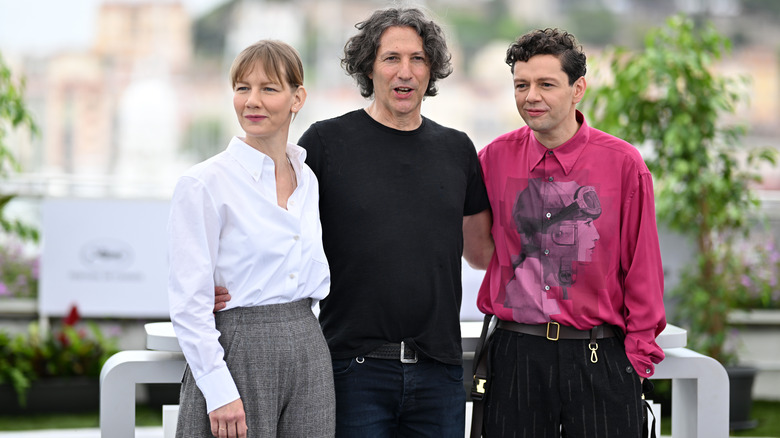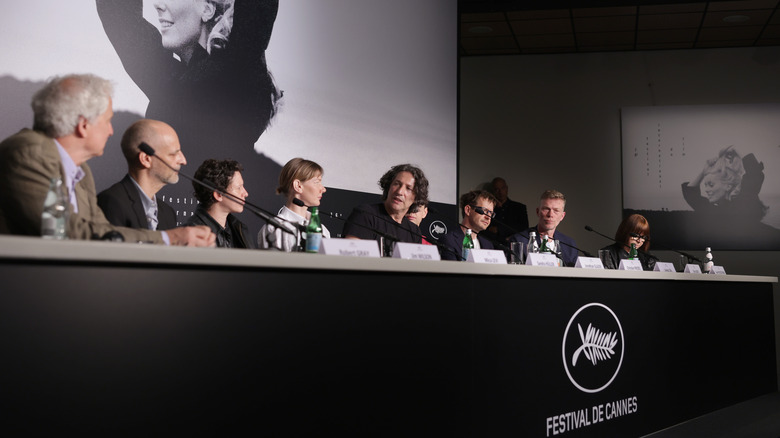The Zone Of Interest Review: The Banality Of Evil
- Deserves every sound award
- The most experimental scenes are incredible
- Makes a statement on the banality of evil
- A lot of the film is boring on purpose
"The Zone of Interest" is the film everyone is talking about at the 2023 Cannes Film Festival. Director Jonathan Glazer has only made three features before this one — 2000's gangster film "Sexy Beast," 2004's polarizing psychological drama "Birth," and 2013's creepy science fiction movie "Under the Skin" – but his growing artistic ambition, combined with the long waits between films, makes a new Glazer movie an event among cinephiles. Adapted from the novel of the same name by Martin Amis (who died the same day as the film's premiere), "The Zone of Interest" is Glazer's most ambitious yet: a Holocaust drama told almost entirely from the perspective of the well-off Nazi family living right next to Auschwitz.
Many have been absolutely blown away by the film, praising it as one of the best handlings of this subject matter ever made. Conceptually, those arguments might very well be correct. So why do I find myself only being blown away by certain moments in "The Zone of Interest" and not by the movie as a whole? I think it's because the very thing that makes the film's message so pointed is the same thing I find myself struggling with as a viewer: the cinema of intentional boredom.
The film's best at its most experimental
The general intellectual underpinning of "The Zone of Interest" is Hannah Arendt's theory of the banality of evil: the idea that genocides and other great evils are perpetrated not merely by sociopaths and ideologues but by ordinary people acting out of thoughtless complacency. This concept is illustrated through the film's portrayal of commandant Rudolf Höss (Christian Friedel) and his wife Hedwig (Sandra Hüller).
We never see Rudolf working in the concentration camp. Instead, we're shown parties, picnics, housework, gardening, and utterly uninteresting familial squabbles. The horror is in the background: high fences, smoke rising from chimneys, and the sounds. So many horrific sounds. Screams, gunshots, and ambient noise merges seamlessly with Mica Levi's musical score, which is often the only thing expressing any emotion while the characters continue to go about willfully ignoring the evil they're perpetuating.
The most powerful scenes are the ones that break the focus on the Höss family's mundane drama in experimental ways. One montage of close-ups of the flowers in Hedwig's garden feels downright demonic, the music reaching a screeching pitch over a monochromatic red screen before cutting suddenly back to another boring party. When the Höss children are being read the tale of "Hansel and Gretel," we witness striking, high-contrast, black-and-white visuals of a girl seemingly struggling to survive on her own. In a rare moment where a Jewish perspective is presented with directness, a Yiddish poem by Auschwitz survivor Joseph Wulf is introduced in voiceover, then left unheard but readable in the subtitles, the piano accompaniment almost turning it into a song.
These moments took my breath away. Overall, though, I found the intellectual rigor of the film superior to the experience of watching most of it. If this gets people to think about their own complicity in today's societal evils, that's great, but I also suspect there's a limit on how many people will actually be able to digest it well enough to get that understanding. Alternately, the point about the banality of evil might be so well-made that you don't even need so much time reiterating it.
Could this have worked any other way?
What makes "The Zone of Interest" so hard to assess is that it's so wildly successful at fulfilling its main purpose (showcasing the banality of evil) that it inadvertently becomes its main weakness (much of the character-focused material is, by design, banal). Could its point have been made as effectively if handled any other way? Perhaps the best counterargument comes from a film that's directly homaged in this one's final scenes: Joshua Oppenheimer's 2012 documentary "The Act of Killing."
A look at the men who perpetuated the American-backed genocide of alleged communists in 1960s Indonesia, "The Act of Killing" explores the banality of evil without ever once being boring to watch. It's one of the most fascinating films I've ever seen, utterly horrific yet impossible to look away from. Unlike the coldly distanced "The Zone of Interest," "The Act of Killing" is very interested in its subjects as people. Some critics argued it had too much interest in them — criticisms addressed by Oppenheimer's follow-up documentary "The Look of Silence," in which a brother of one of the victims of genocide gets to directly confront these perpetrators.
I don't think "The Zone of Interest" could do what "The Act of Killing" did — it's not a documentary (aside from one sequence which might be the best thing in the film), it's not getting a companion film to address other perspectives, and it's dealing with a genocide that's been dramatized far more frequently and that Western audiences are far more familiar with. Yet referencing "The Act of Killing" in the film's climax reminded me that there are other movies dealing with the banality of evil that shook me far more than this one managed to.
"The Zone of Interest" premiered at the 2023 Cannes Film Festival and will be released in theaters by A24 later this year.


